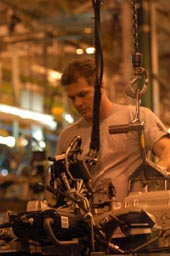A new study concludes that Canadian automotive assemblers are more productive than their U.S. and Mexican counterparts.

An assembler at Chrysler's assembly plant in Windsor, ON, works on an engine. According to a CAW study, labor productivity is more than 11 percent higher in Canadian auto plants than in U.S. plants and 35 percent better than in Mexican facilities. Photo courtesy Chrysler
Anew study, prepared by CAW economist Jim Stanford, concludes that Canadian automotive assemblers are the most productive on the continent, beating factory labor in Mexico and even nonunion workers at the U.S. plants of Japanese and European carmakers.
Perhaps not surprisingly, the study arrives as the union faces pressure by Canada’s Conservative government to make concessions to GM and Chrysler as a condition for winning $4 billion in emergency loans. GM of Canada is in talks with CAW officials and wants to strike a deal with the union before it taps any aid.
According to the study, CAW-represented auto plants are 6 percent more productive than the nonunion Canadian plants of Toyota and Honda, 8 percent more productive than U.S. plants represented by the United Auto Workers, and 24 percent more productive than the nonunion U.S. plants of foreign automakers.
The study is based on industry and government data from 1998 to 2007, and borrows heavily from The Harbour Report. In 2007, CAW workers took an average of 20.36 hours to assemble a vehicle at the Canadian plants of GM, Chrysler and Ford, the study claims. That compares with 21.66 hours at Canada’s Toyota and Honda plants, and 25.24 hours at the U.S. plants of Toyota, Honda, Nissan, Hyundai, Mercedes and BMW. Assemblers at the Mexican factories of VW and Nissan fared the worst, taking 32.54 hours on average to build a car.
With all the force of a stiff cross-check into the boards, the study further asserts that Canada has been the most productive jurisdiction for automotive assembly since at least 1998. Over the past decade, Canadian auto plants, both union and nonunion, have been 5 percent to 10 percent more productive than their U.S. counterparts. In fact, since 1998, labor productivity in Canada has improved 22.4 percent, compared with 18 percent in the United States and 35 percent in Mexico. Real GDP per Canadian employee in motor vehicle assembly increased by 43 percent over that same time period.
The CAW represents 27,800 workers at the Detroit automakers in Canada. Analysts have estimated the union’s auto members will need to make adjustments to their compensation worth $15 to $20 an hour to help the Detroit automakers build a sustainable manufacturing base in Ontario.
The Canadian government offered $3 billion to GM and $1 billion to Chrysler late last year on condition the companies submit restructuring plans by Feb. 20 proving they could stay in business in Canada in the long term. So far, neither company had taken advantage of the loans.
You can read the entire CAW studyhere.Perhaps you’ll conclude that U.S. assemblers might benefit from some time in the penalty box.
Labor Productivity in Auto Assembly Plants
|
Cars Assembled, |
Hrs. Worked, 2007 (millions) |
Hrs. / Vehicle, 2007 |
Hrs. / Vehicle, |
|
|---|---|---|---|---|
| Canada |
2.53 |
52.47 |
20.71 |
26.68 |
| United States |
10.06 |
232.01 |
23.06 |
28.14 |
| Mexico |
1.94 |
54.3 |
28.03 |
43.08 |
